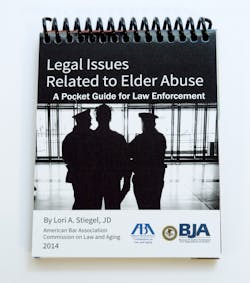Elder abuse is one of society’s most pervasive social problems, and also one of the most difficult for authorities to alleviate. But some help is on the way. The American Bar Association’s Commission on Law and Aging has just published “Legal Issues Related to Elder Abuse: A Pocket Guide for Law Enforcement.”
The pocket-sized guide addresses legal concepts, documents and tools that may be misused to commit elder abuse or used properly to remedy it, as well as issues and actions that justice system professionals should consider if they suspect such abuse has occurred. The 55-page, laminated guide is small enough (5 inches by 4 inches) to carry with other equipment or be attached to the visor of a patrol car.
The guide (also available in PDF format) provides brief, simple explanations of:
- legal concepts and tools, and why they are relevant to elder abuse victims (for example, how they may be used to commit or redress elder abuse);
- issues that justice system professionals and other service providers should consider; and
- actions that justice system professionals and other service providers should consider taking.
An innovative series of colored tabs allows users to quickly access specific background information, or legal documents and tools. Italicized terms in the text indicate that there is a tab devoted to that topic.
Information about ordering copies of the pocket guide, at no cost, can be found at www.ambar.org/ElderAbuseGuides.
Elder abuse is often used as a general term that includes physical, sexual and psychological abuse; neglect; and financial exploitation. It harms millions of older people each year and victims may face increased risk of death, physical or emotional injury and financial ruin. Elder abuse costs society billions of dollars annually in lost income and assets, and in health care, social services and legal system expenses.
The guide, by ABA Senior Attorney Lori Stiegel, begins with a quote from retired Ohio sheriff Dale Gillette: “My colleagues and I need to know that when we’re told, ‘I could spend Dad’s money because I have his power of attorney,’ we shouldn’t just say, ‘Oh, OK,’ and walk out.”
The ABA Commission on Law and Aging published the guide with funding from the Bureau of Justice Assistance, an entity of the U.S. Department of Justice.






